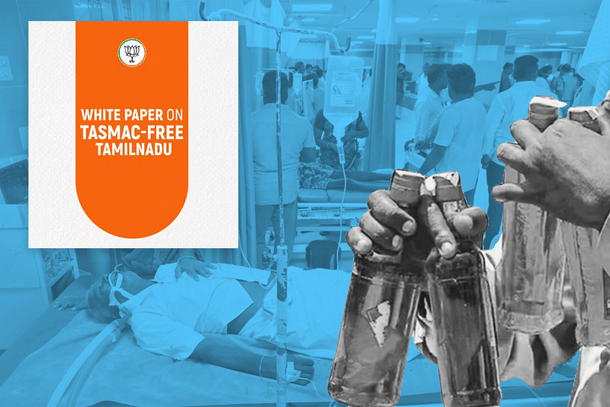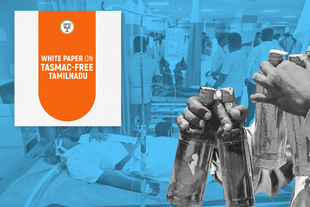Tamil Nadu
Tamil Nadu Hooch Tragedy: Time To Have A Relook At BJP's TASMAC White Paper
S Rajesh
Jun 29, 2024, 05:35 PM | Updated 05:35 PM IST
Save & read from anywhere!
Bookmark stories for easy access on any device or the Swarajya app.


Tamil Nadu's Kallakurichi district recently witnessed a hooch tragedy in which more than 60 people lost their lives and hundreds were left in critical condition.
This was the second such tragedy in two years — over 20 people lost their lives in Viluppuram and Chengalpattu districts last year — and thus people across Tamil Nadu were visibly agitated and angry.
The opposition parties, the All India Anna Dravida Munnetra Kazhagam (AIADMK) and the Bharatiya Janata Party (BJP), came down heavily on the M K Stalin government.
They demanded the resignation of Excise and Prohibition Minister S Muthusamy and Chief Minister Stalin for their inability to crack down on illicit liquor. They also sought a probe by the Central Bureau of Investigation (CBI).
There has also been a popular demand for the closure of state-owned Tamil Nadu State Marketing Corporation (TASMAC) shops, which have a monopoly on liquor sales in the state.
People contend that due to the easy access to liquor in these shops, there is a tendency to become addicted to drinking. Unable to afford Indian-made foreign liquor (IMFL), people turn to illicit liquor, which is cheaper.
While outrage against the government is expected in a tragedy of such scale, it is important to look at what could prevent such incidents from occurring again.
One solution is a gradual move towards prohibition in the state. It was suggested by the BJP in its 'White Paper on TASMAC-free Tamil Nadu', released in the aftermath of last year’s hooch tragedy. (Read Swarajya's article on the white paper.)
In the document, the party called for phased prohibition with a 75 per cent reduction in alcohol manufacturing and distribution over a few years. It also laid out a plan to make sure the government’s revenues are not badly affected by the decision.
According to the white paper, TASMAC should simultaneously reduce the number of outlets and the amount of liquor it procures from distilleries.
Further, purchases should fall to 80 per cent in the first year, 55 per cent in the second, and 30 per cent in the third. In the fourth year, it should reduce to 25 per cent and thus meet the target of a reduction of 75 per cent.
To reduce demand, the white paper called for the closure of bars associated with TASMAC shops to deter people who do not have private spaces for drinking.
An increase in public awareness, a reduction in the number of sale hours, an increase in the number of dry days, and the rehabilitation of alcoholics have also been advised.
For rehabilitation, it proposed a 200-bed rehab centre in every taluka and a monthly support of Rs 15,000 to the families of those undergoing the process.
As an alternative to liquor, it suggested lifting the ban on toddy, which reportedly has a lower alcoholic content.
It also recommended the state focus on creating a Rs 1 lakh crore toddy and palm products industry. The products include palm jaggery, handicrafts, candy, jam, dates, neera, and coir.
To address the loss in revenue due to the closure of TASMAC shops, it recommended the state government diversify its revenue sources by encouraging tourism and giving a fillip to industries like bioplastics, biotechnology, electronics, and software as a service (SaaS).
The white paper stated that the projected revenue of Rs 38,539 crore as a result would be more than the estimated revenue loss of Rs 35,333 crore.
While the timelines may be steep and some of the measures might be difficult to implement, they should definitely be considered now. After all, the state cannot forever turn a blind eye to the problem.
A few arrests, seizures of illicit liquor, and declarations of compensation to the families of victims right after a tragedy do not constitute a resolution. Stronger and more comprehensive measures, such as those suggested in the white paper, are required.
S Rajesh is Staff Writer at Swarajya. He tweets @rajesh_srn.





